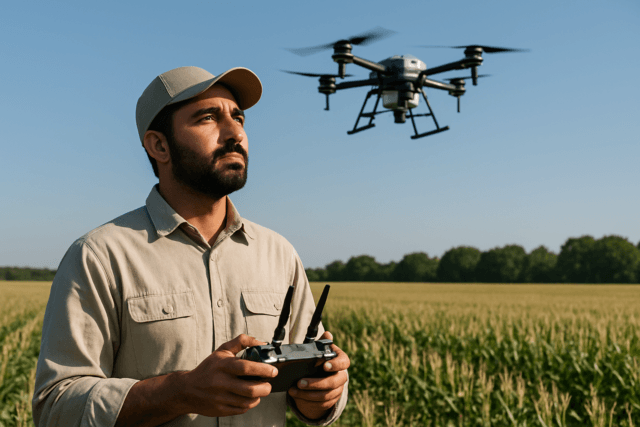Antwerp, Belgium – Belgian hospitals have begun trials for an on-demand medical delivery service utilizing unmanned aerial vehicles (UAVs), commonly known as drones, with a significant development seeing some flights remotely piloted from the United Kingdom. This initiative aims to revolutionize the transport of urgent medical cargo, including medication and pathology samples, promising faster and more efficient delivery than traditional ground-based methods.
Early Trials and Key Players
One of the latest trials, which commenced on August 1st, involves UK-based Skyports Drone Services collaborating with healthcare provider AZ Turnhout in the Kempen region, east of Antwerp. This project focuses on shuttling urgent medical cargo between the AZ Turnhout St Jozef and AZ Herentals hospital campuses, using A-kwadraat as a central operational hub. A notable aspect of this trial is the regulatory approval obtained by Skyports to pilot the drones from its remote operations center in the southeast UK, a development that is expected to facilitate scalable and cost-effective delivery networks.
Prior to this, Belgium has been at the forefront of medical drone innovation in Europe. As early as August 2022, Belgian hospitals initiated trials for drone delivery of human tissue samples between operating theatres and medical laboratories in Antwerp. These pioneering flights were orchestrated by Helicus, a Belgian company that holds the distinction of being the only firm in Europe granted a license for unmanned aircraft use in medical contexts over cities and beyond visual line of sight (BVLOS). Helicus has been working towards establishing a commercial operation with regular flights since 2024, with its Aero Initiative (HAI) and Medrona project aiming to develop a system for reliable, ecological, and efficient medical parcel transport. This includes human tissue, blood and urine samples, and pharmacy preparations.
The Technology Behind the Deliveries
The current Skyports trial utilizes two types of drones: the RigiTech Eiger for the longer 18.7km route to Herentals and the Speedbird DLV-2 for the 4.4km route to St Jozef. These drones are designed to carry medication and pathology samples. The RigiTech Eiger can cover 18.7km in 13 minutes, compared to 30 minutes by road, with an average cruise speed of 29 m/s and a maximum payload of 3kg. The Speedbird DLV-2 covers 4.4km in seven minutes, compared to 16 minutes by road, with an average cruise speed of 16 m/s and a maximum payload of 5kg. Airspace receivers have been installed on hospital roofs to aid integration.
Helicus, in its earlier trials, has also employed remotely operated drones to transport human blood samples and tissues, making it the first time in the EU such a feat was achieved in an urban setting. These flights were operated BVLOS, a significant advancement from earlier tests in 2019 that required pilots at both take-off and landing sites. This move towards remote and automated operations is crucial for efficiency and scalability. Orange Belgium has also played a role, providing 5G connectivity to Helicus, which is vital for reliable, low-latency, and high-bandwidth communication needed for remotely controlled command and control centers.
Advantages of Medical Drone Transport
The shift to drone medical delivery offers several compelling benefits for the healthcare sector:
Enhanced Speed and Efficiency
Drones offer significantly faster transport times compared to traditional road-based methods, which are often hampered by traffic congestion. For instance, a 40-minute car journey can potentially be completed in 10 minutes by drone. This speed is critical for urgent medical cargo such as tissue samples that require rapid analysis for surgical decisions. This leads to improved patient care and treatment times.
Cost Reduction and Centralization
By centralizing testing laboratories and other facilities, hospitals can save money. However, this centralization can increase the distance between patients and specialized services. Drones provide a fast and efficient logistics system to bridge this gap, potentially reducing delivery costs for the medical network by allowing easy scaling of the delivery network.
Environmental Benefits
Drones are a more environmentally sustainable option than vehicles, emitting significantly less carbon dioxide. An estimated 70g of CO2 per package delivered by drone compares favorably to 444g for a conventionally delivered package.
Improved Access and Reliability
Drones are unaffected by road traffic delays and closures, offering more predictable and reliable delivery times. This is particularly beneficial for reaching remote or hard-to-access areas, ensuring timely access to critical medicines and samples.
Challenges and Future Outlook
Despite the promising advancements, the widespread implementation of medical drone shuttles faces several challenges:
Regulatory Framework
While significant regulatory breakthroughs have been achieved, particularly regarding BVLOS flights and remote piloting from another country, further legislative work is needed at the European Parliament level to enable daily, widespread use. Harmonized rules across the EU are crucial for scaling operations.
Technological Limitations
Drones currently have limitations in terms of payload capacity, typically carrying only light items (2-4 kg), which restricts the range of medical supplies they can transport. Battery lifespan and dependence on weather conditions (such as strong winds or heavy rain) also pose operational challenges, potentially leading to intermittent service. Ensuring temperature control and maintaining the physical integrity of sensitive medical materials like blood samples during transport are also critical considerations.
Integration and Public Acceptance
Integrating drone operations safely into existing airspace and healthcare logistics chains requires robust unmanned traffic management systems. Public acceptance and safety concerns also need to be continuously addressed through rigorous testing and transparent communication.
Belgian projects like the Skyports and Helicus initiatives are serving as crucial platforms for establishing permanent medical drone delivery networks. The ongoing trials are not only demonstrating technical feasibility but also building safety assessments for specific inter-hospital flight corridors and contributing to the development of new regulations. With continued innovation and regulatory progress, medical drone shuttles are poised to become an integral part of modern healthcare logistics, offering a faster, more efficient, and environmentally friendly solution for critical medical transport.





